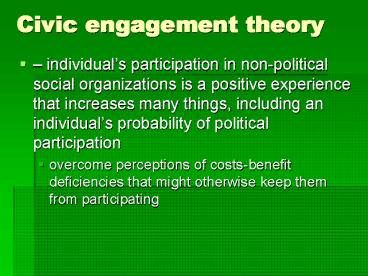Civic engagement theory PowerPoint PPT Presentation
1 / 9
Title: Civic engagement theory
1
Civic engagement theory
- individuals participation in non-political
social organizations is a positive experience
that increases many things, including an
individuals probability of political
participation - overcome perceptions of costs-benefit
deficiencies that might otherwise keep them from
participating
2
- How does interacting with other individuals
within non-political civic associations greater
individual probability of political
participation?? two proposed causal mechanisms - 1) Mobilization
- filtering of info
- provide some important validation and
non-political benefits to the act of
participation - Solidary and purposive benefits
- Types
- Direct vs. indirect
- Targeted and timed
- Doesnt necessarily require personal, physical
interaction between citizens
3
- 2) Social capital theory those features and
by-products of active engagement within social
organization, such as networks, norms and social
trust, that facilitate coordination and
cooperation of individual citizens for mutual
benefit. - Face to face participation in non-political
social organizations is a positive for democratic
government to the extent that these groups create
networks, norms, and social trust that increase
individuals probability of political activity
4
2 non mutually exclusive Causal Mechanisms of SC
- Civic skill participatory or democratic type
activities which parallel forms of political
participation and which are supposed to increase
the likelihood of members participating in the
political process. - nuts and bolts of democratic participation
- examples include giving a speech/presentation in
connection the group or attending a decision
making meeting
5
- How do Civ Skills work?
- skills (letter writing, speeches, etc.) thought
directly transferable to many forms of political
participation - democratic training (civic virtue?)
- Costs?
- practice of such skills demonstrate to their
practioners the effectiveness and importance of
participation in general, altering perceptions of
relative benefits of democratic behavior - If democratic participation works on one level,
than they may be more inclined to see it as
useful at the electoral level - indirect benefit ?
6
2nd SC causal mechanism
- Democratic attitudes as citizens actively work
with one another, are forced to compromise, take
in and debate (be exposed to) the views of
others, etc., they will begin to appreciate the
value and moral responsibility of citizenship and
participation - sacrifice of immediate short term self-interest,
the incursion of personal costs for a good
greater than their own, has some actual value or
payoff.
7
- appreciate value of a federal democratic republic
- Civic virtue?
- Collective action with other citizens is possible
and needs to be practiced to maintain civic
virtue
8
Assumptions
- decision of a citizen to join a civic association
or not is similar to the decision to politically
participate - People may be more willing to join less overtly
than more overtly political groups - Civic associations tend to have lower thresholds
and barriers for participation than parties or
political interest groups. - strong civil society creates a stronger quality
democratic republic - Assumption that more participation better
9
Implications of Casual Mechs
- Active participation?
- Informed participation?
- Expansive participation?
- Type of social organization that works best?
- Hierarchical?
- Diverse?
- Exclusive?
- Focus?

